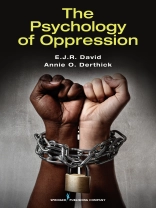Written in an engaging and relatable manner, this book reviews the psychological theories and research on the topic of oppression – its evolution, its various forms, and its consequences. Painful historical examples and modern-day occurrences of oppression including mass incarceration, LGBT and transgender issues, police brutality, immigration reform, anti-Muslim sentiments, and systemic racism are explored. How oppression exists and operates on various levels, the mental and behavioral health consequences of oppression, and promising clinical and community programs to eradicate oppression are reviewed. The authors hope that by providing readers with a basic understanding of oppression it will motivate them to combat bias to create a more just, harmonious, and healthy world.
Highlights include:
Ideal as a text in upper level undergraduate and beginning graduate courses on oppression, prejudice and discrimination, race relations, ethnic studies, ethnic and racial minorities, multicultural or cross-cultural psychology, multicultural counseling, diversity, women’s studies, LGBT studies, disability studies, and social justice taught in psychology, social work, and counseling. Behavioral and mental health providers in both clinical and community contexts will also appreciate this book.
Tabella dei contenuti
Preface
1. OPPRESSION 101: AN OVERVIEW
2. HISTORICALLY AND CONTEMPORARILY OPPRESSED GROUPS
3. HISTORY IS NOW!: HISTORICAL AND CONTEMPORARY OPPRESSION
4. THE EVOLUTION OF OPPRESSION: FROM BLATANT TO SUBTLE, TO BLATANT AGAIN?
5. THE THREE I’s OF OPPRESSION: INTERPERSONAL, INSTITUTIONAL, AND INTERNALIZED
6. SO WHAT?: PSYCHOLOGIAL AND MENTAL HEALTH IMPLICATIONS OF OPPRESSION
7. WHY IS THERE OPPRESSION?: SOCIAL PSYCHOLOGICAL THEORIES ON THE EXISTENCE AND PERSISTENCE OF OPPRESSION
8. ADOPTING A SOCIAL JUSTICE ORIENTATION: ADDRESSING OPPRESSION IN THE CLINICAL CONTEXT
9. BEYOND LABORATORIES, CLINICS, AND CLASSROOMS: COMMUNITY EFFORTS TO ADDRESS OPPRESSION
Circa l’autore
Annie O. Derthick, Ph D is currently working on her post-doctoral licensure at a clinic for the uninsured and underserved, where she works with members of marginalized and disenfranchised communities utilizing a Liberation Psychotherapy framework to address the complex relationship between psychological well-being and a divisive, oppressive socio-political-historical-cultural-economic context for sexual and gender minority groups, immigrants and refugees, and individuals with limited English proficiency.












